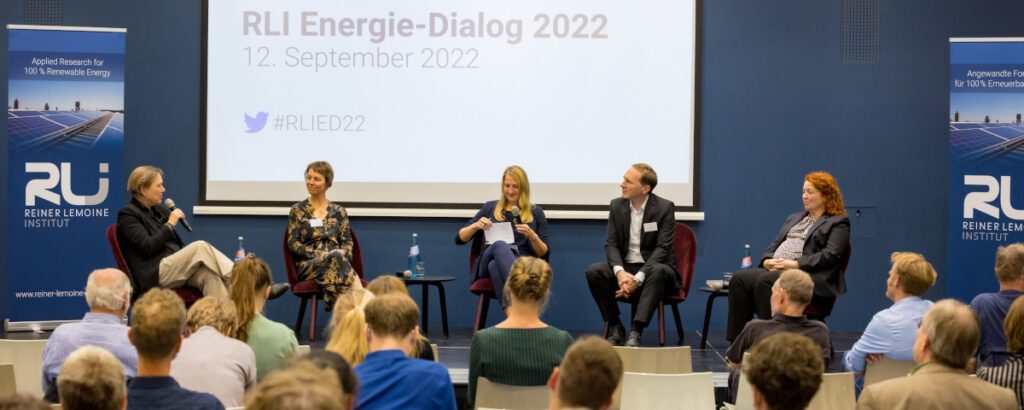A look back at the 2022 RLI Energy-Dialog
September 16th | The sixth RLI Energy Dialogue (RLIED) took place on September 12, 2022. This year, RLI Managing Director Kathrin Goldammer, together with the Reiner Lemoine Foundation (RLS), welcomed more than 100 people again to a face-to-face event in Berlin. The participants from science, administration, politics and business came together to discuss the topic “With new framework conditions and the same goal: How to succeed in the turnaround to a resilient energy system with 100 percent renewable energy?” . In 2020, the event had to be cancelled due to Corona pandemic; the following year, it took place digitally.
Kathrin welcomed the attendees and opened the event. Anja Lemoine, curator of the Reiner Lemoine Foundation, then introduced the Wuselwerk as the foundation’s new network founded in 2022. The event focused on four workshops on current issues of the energy and transport transition as well as a panel discussion.
Workshops on the energy and transport transition
During the workshop phase, participants were able to actively contribute to questions from all three research areas of the RLI and from the RLS. Specifically, the workshops addressed the question of where the energy transition is taking place, the speed of the transport transition, paths to a climate-neutral electricity system, and international perspectives and cooperation on green hydrogen. The results of the workshops were then presented in the plenary session.
Taking global and local perspectives
In the workshop on “Urban-rural nexus – where does the energy transition take place?”, participants considered the field of tension between rural and urban areas from different perspectives. During the discussion on opportunities, challenges and approaches to solutions, it became clear that many issues cannot be solved one-sidedly or independently of each other – especially with regard to topics such as acceptance, infrastructure or distributive justice. An interesting aspect was the question of the role of digital spaces and instruments for issues of the energy transition.
A holistic and global view was also important to the participants of the workshop “Green hydrogen – international perspectives and local value chains”. It became apparent that the view of energy importing and exporting countries on the use of green hydrogen can be very different and that colonial patterns should not be repeated.
Exclusive survey results and solution approaches for the transport turnaround
The climate-neutral electricity system needs to be rethought as a renewable energy system – this is the conclusion from the workshop “Pathways to a Climate-Neutral Electricity System” held by the RLS graduate school. During the workshop, the fellows of the graduate school gave an exclusive insight into an unpublished expert survey. The answers of 130 survey participants provided impulses for the workshop: What catch-up needs exist in the areas of social policy, technology and business for achieving a climate-neutral electricity system – this was discussed by the participants in the workshop. The results of the survey will be published in October. They will form the basis for recommendations for action that the fellows will then address to policymakers.
In the workshop on possibilities for an accelerated traffic turnaround, the RLI researchers discussed with representatives from politics, business and industry. Among other things, the participants discussed the questions of which requirements need to be reconsidered, where the legal framework is lagging behind technical development, and also where the traffic turnaround must also be a mobility turnaround. The different perspectives led to a realistic assessment of obstacles and possible solutions.
Panel discussion shows urgency and hurdles in the expansion of renewable energies
In the panel discussion, Kathrin spoke with Carolin Schenuit, Executive Director, Forum Ökologisch-Soziale Marktwirtschaft e. V., Henrik Vagt, Managing Director Economy & Politics, IHK Berlin, Kathrin Thomaschki, Head of Division Social Participation in Transformation at the Federal Ministry of Economics and Climate Protection and Neelke Wagner, Consultant Hydrogen, Sector Coupling and Climate Protection, Klima-Allianz Deutschland e.V. about current energy policy developments and the expansion of renewable energies.
The participants in the discussion agreed above all that renewable energy must be expanded locally in Germany. Under which framework conditions and by means of which instruments was part of the discussion.
While Kathrin Thomaschki emphasized that social dialogue and the participation of citizens are just as important as calculations and regulations, Henrik Vagt urged an acceleration of approval procedures.
We must not allow ourselves to be distracted from our own homework, Carolin Schenuit pointed out, and the message in the current debate must not be that we cannot afford climate protection. Neelke Wagner followed this up: The energy transition must be organized in such a way that social justice is also taken into account, she said. “We have to get to the point where the most cost-effective option – generating electricity with renewable energies – also reaches the people who have little,” Neelke Wagner said in the closing round.
Materials and results of the workshops are available for download
At the end of the event day, the RLI and RLS jointly hosted a reception and networking at the Hotel Rossi.
The RLI would like to thank all participants for the exciting contributions and the nice day together!
Below you will find impressions of the event day as photos as well as the materials and results from the workshops. We look forward to seeing you again at the RLI Energy Dialogue 2023.
